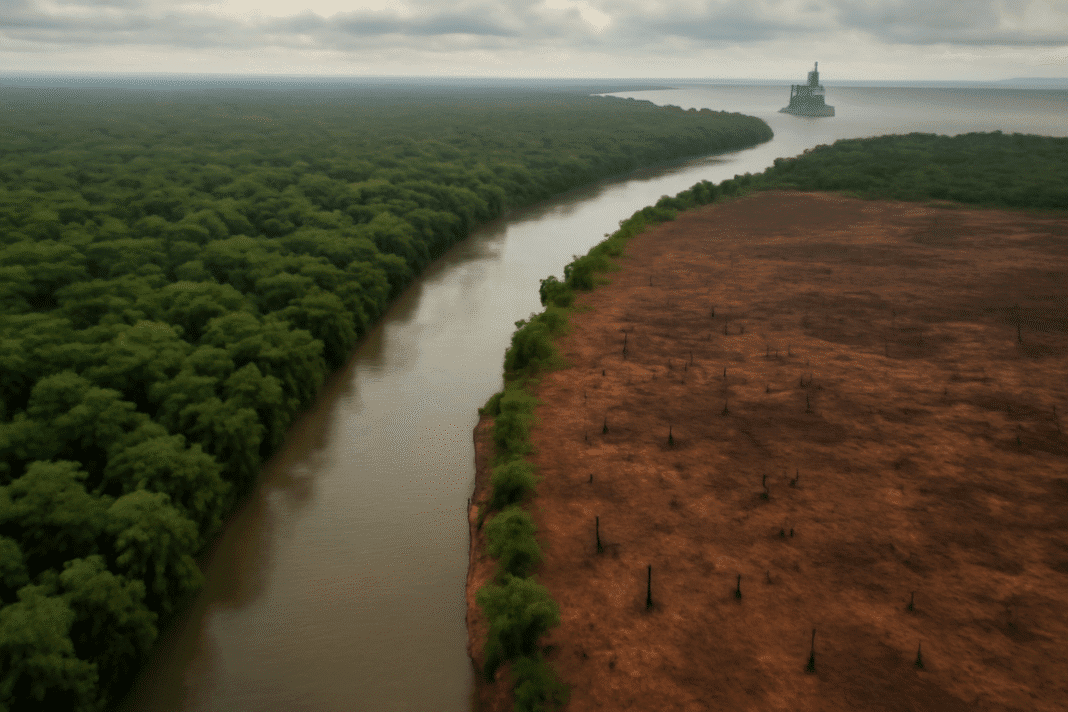A new flashpoint in Brazil, the nation with most of the planet’s biggest rainforest, has surfaced as the world deals with accelerating climate change. 250 climate scientists have boldly sent an open letter asking Brazilian President Luiz Inacio Lula da Silva to stop further exploration of oil and gas in the Amazon and offshore areas. This urgent call coincides with the United Nations climate negotiations in Bonn, Germany, and comes as Brazil gets ready to host COP30 in Belém, so underlining the environmental policies of the country under worldwide attention.
The scientists’ worries, the environmental and social hazards of oil development, the reaction of Brazilian government, and the wider consequences of this discussion for world climate action are investigated in this article.
The Amazon Near Tipping Point
Unprecedented Safety Concerns Regarding Oil Expansion
Often called the “lungs of the Earth,” the Amazon rainforest absorbs enormous volumes of carbon dioxide and controls world temperature. Still, it is under hitherto unheard-of danger. Not only for Brazil but for the earth as well, the increase of oil and gas exploration in this area raises serious hazards.
Further development of fossil fuels in the Amazon could drive the ecosystem beyond a crucial “tipping point,” warn scientists. This is the point at which the rainforest might irreversibly become a savannah, spewing billions of stored carbon, destroying biodiversity, and changing regional and worldwide climate patterns. Arguing that ongoing fossil fuel use is essentially incompatible with international climate goals, the open letter delivered at the UN climate conference in Bonn highlights this risk.
The Science Supporting the Amazon Tipping Point
Recent research indicates that combined with climate change and industrial activities like oil drilling, deforestation raises the likelihood that vast swaths of the Amazon could lose their capacity to sustain themselves as rainforests. As the Amazon moves from a carbon sink to a carbon source, this process would not only endanger thousands of distinct species but also hasten world warming.
The Open Letter of Scientists: An All-Around Plea Under Strong Coalition
The open letter reflects the combined voice of 250 climate scientists from all around the globe. Their message is unambiguous: Brazil has to give up on proposed new gas and oil projects in most sensitive environmental areas. With the world community assembling for climate negotiations in Bonn and ahead to COP30 in Brazil, timing is crucial.
Emphasizing that this event is historically important, the letter requests a “fast, fair, effective, and full phaseout of fossil fuels.” Scientists contend that now is the time Brazil should show real climate leadership as the Paris Agreement’s 10-year anniversary approaches.
Historical Contextual Value
The scientists underline that choices taken now will be remembered for decades to come. Expanding fossil fuel extraction in the Amazon and offshore areas would compromise Brazil’s credibility as a climate leader and jeopardize world efforts to reach the Paris Agreement targets, they warn. The letter asks President Lula to match Brazil’s energy plans with its pledges to safeguard the Amazon and fight climate change.
Indigenous and Environmental issues
Insufficient Guidance
The claimed lack of consultation with Indigenous people and local stakeholders is one of the most divisive features of Brazil’s oil aspirations. These groups contend that although being most impacted by environmental damage and oil spills, their voices have been excluded from the process of making decisions.
Long protectors of the Amazon, indigenous groups have maintained its cultural legacy and biological diversity. They warn that in addition to endangering their rights as acknowledged under international law, oil drilling compromises their lands and means of subsistence.
Environmental Sensibility
Environmental organizations have repeated these worries, noting that the offshore areas of Brazil and the Amazon are ecologically sensitive. With long-term effects on local people and wildlife, oil exploration and extraction can cause deforestation, pollution, and habitat loss. Critics contend that the government’s environmental studies have been insufficient and that the actual expenses of increasing the use of fossil fuels have been understated.
Brazil’s View: Juggling Environment and Economy
Lula’s Case Study
Defending Brazil’s plans for the development of fossil fuels, President Lula has maintained that the country’s green energy transformation depends on the income from oil and gas. Lula claims these tools can be used to fund sustainable development, social projects, and renewable energy initiatives.
This viewpoint captures the complicated reality that many rich natural resource-rich developing nations are committed to tackling yet also face. Seeking to balance two conflicting goals, Lula has positioned himself as a champion of both environmental protection and economic development.
The Reaction of Critics
Critics—including environmental activists and the scientific community—contend, however, that political obstacles rather than technological or financial ones define Brazil’s resistance to climate action. They contend Brazil is capable of leading in clean energy without depending on additional expansion of fossil fuels. They argue that what is lacking is the political will to make audacious decisions putting social and environmental well-being above transient financial benefits.
The function of international climate negotiations
Bonn Conference on Climate Change
The delivery of the scientists’ letter at the Bonn UN climate conference emphasizes the global aspect of the discussion on Brazil’s energy policy. Other nations, NGOs, and environmentalists as well as Brazil’s actions under ongoing negotiations are under great scrutiny.
The COP30 lead from Brazil, Ambassador André Corrêa do Lago, acknowledged the issues expressed by the scientific community after receiving the letter. Although this is a noteworthy gesture, it is yet unknown if it will affect President Lula’s strategy considering the complexity of Brazilian politics.
Future Looking Ahead to COP30
Scheduled for Belém, Brazil, COP30 will be a historic occasion for world climate action. Brazil, the host country, will face great pressure to show leadership and Paris Agreement commitment. The choices taken in the next months will define not only the Amazon’s fate but also the worldwide fight against climate change.
The Global Setting: Climate Objectives and Fossil Fuels
Paris Deal and Net Zero
Adopted in 2015, the Paris Agreement aims to keep world temperature well below 2°C by means of initiatives aiming at keeping it below 1.5°C. Reaching this goal calls both a quick drop in fossil fuel consumption and a shift to renewable energy sources.
Though some areas have made progress, global fossil fuel output is still high and new projects in sensitive areas like the Amazon run the risk of deraying climate targets. If the world is to avoid catastrophic climate impacts, scientists and climate activists warn that increased fossil fuel extraction has no place.
Brazil’s Original Accountability
Being the biggest tropical rainforest in the world and a big oil producer, Brazil holds a special place in the scene of global climate. The choices the nation makes about oil and gas exploration will have broad consequences for Indigenous rights, climate stability, and biodiversity.
The scientific community is urging Brazil to set an example showing that environmental protection and economic growth are not incompatible. Investing in clean energy and defending the Amazon will help Brazil lead other countries and significantly contribute to the worldwide change toward a sustainable future.
Pathways Forward: Substitutes for Expanding Fossil Fuels
Putting money into renewable energy
One of the main points of contention raised by environmental organizations and scientists is Brazil’s great capacity for the growth of renewable energy. Already leading worldwide in bioenergy, hydropower, and wind energy is the nation. Brazil can generate employment, boost economic development, and lessen reliance on fossil fuels by additional solar, wind, and other clean technology investments.
Guarding the Amazon
Apart from maintaining the stability of the climate, preserving the Amazon is essential for safeguarding biodiversity and so supporting Indigenous people. Alternative routes for economic development without endangering the health of the rainforest are sustainable land management, reforestation, and ecotourism.
Worldwide Assistance and Cooperation
The shift from fossil fuels calls for global support and cooperation. Richer countries and multilateral organizations can offer Brazil and other developing nations financing, technology, and capacity-building tools to enable them follow sustainable development paths.
The political challenge: Will Brazil pay attention?
Inner Complexities
Political, financial, and social elements interact intricately to form Brazil’s energy policy. At the highest levels, decision-making is influenced by strong interests in the oil and gas sector, regional development goals, and temporary economic pressures as well as by personal preferences.
Maintaining Brazil’s leadership in environmental protection while juggling these conflicting needs presents a difficulty for President Lula. The next months will be crucial in deciding whether public pressure and scientific recommendations can change the stance of the government.
The Authority of Collective Opinion
Driving political change depends critically on public awareness and mobilization. Civil society, Indigenous groups, and environmental organizations will be crucial in holding leaders responsible and promoting sustainable policies as the focus of the world moves to Brazil ahead of COP30.
In essence, Brazil and the world have a defining moment.
The appeal of 250 worldwide scientists to stop Amazon and offshore drilling marks a turning point in the battle against climate change. Brazil finds itself at a crossroads with the chance to lead the globe by safeguarding the Amazon and advancing a fair transition to renewable energy.
The decisions taken by President Lula and his government will have long-lasting effects on the world climate as well as on the environment and population of Brazil. All eyes are on Brazil as the planet gets ready for COP30 to meet the challenge and grab this defining moment for the future of our earth.
Important conclusions
250 climate experts have urged President Lula to halt new offshore and Amazon oil and gas projects.
The Amazon is dangerously close to turning from rainforest to savannah should the growth in fossil fuels continue.
Environmental groups and indigenous people question the lack of ecological risks and consultation.
Although President Lula contends that Brazil’s green energy shift depends on the income from fossil fuels, scientists point out that the main obstacle is insufficient political will. As Brazil gets ready to host COP30, the world is observing with hopes that the nation will match its policies to world climate targets.
Often Answered Questions
Why is the fight against climate change so dependent on the Amazon? The Amazon rainforest controls world temperature and stores enormous quantities of carbon. Its destruction would accelerate world warming and release major greenhouse emissions.
The Amazon’s tipping point is what? The tipping point is the point beyond which the Amazon might no longer be able to sustain itself as a rainforest, turning into a savannah and losing its biodiversity and climate-regulating qualities.
Can Brazil switch to renewable energy without income from oil? Experts contend that Brazil has great potential for renewable energy and that strong political decisions and international support can help to ensure a successful transition free from new development of fossil fuels.
Why is COP30 important? What is it? Planned for Brazil, COP30 is the 30th United Nations Climate Change Conference. This is a significant occasion when nations negotiate worldwide climate action; Brazil’s leadership will be much discussed.
Brazil has the opportunity to be a transforming agent in the world reaction to climate change by emphasizing sustainable paths and following scientific advice. The planet waits to decide which road it will take.




